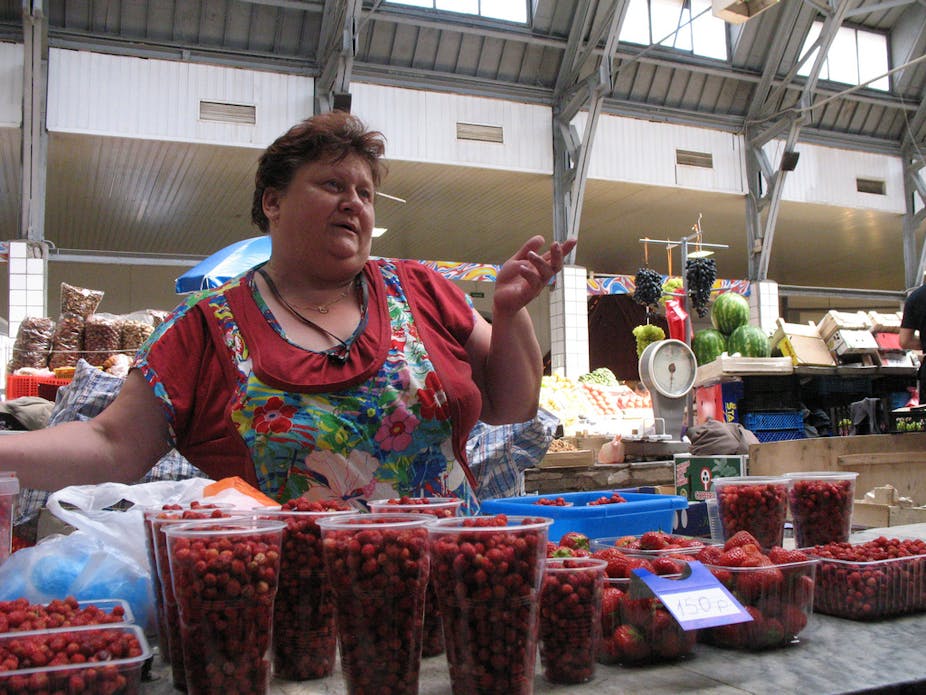Increasingly the saga of East-West economic relations is developing independently of the actual conflict in Ukraine and the surrounding region, leading to various unexpected outcomes.
Take Russia’s own set of economic sanctions which block food exports from the EU, North America, Australia and Norway. That these measures will stimulate Russia’s own farming industry might be expected – the country has to feed itself, after all – but the impact on Belarus and Kazakhstan is less obvious. A customs union between the three nations suddenly means Russia’s two neighbours will be at the forefront of the economic battles between East and West.
Items specifically targeted in the latest sanctions include meat and poultry, dairy, fish, fruit and veg, as well as grains. The measures will be in place for the next year, unless Western sanctions against Russia are lifted.
Russia has become a big food importer in the post-Soviet years. As a result, domestic producers have long been kept out of consumer markets by retail monopolies that gain higher profits through trading in cheaper food imports from the West.
Importantly, since 2001, the pockets of the Russian consumer have been deepening steadily. With its large population, the country now represents a big strategic consumer market, and it is notable that European and American exporters have expressed their concerns about the Russian sanctions.
The ban on western imports is unlikely to trigger a return to Soviet-style food shortage and empty stores. But there are new factors at play, and new intermediaries could seize the opportunity to inflate the prices on western food brands already in warehouses. Many multinational giants like Danone, Carlsberg or PepsiCo have factories inside Russia; without competitor products from the EU it will be tempting to raise prices for Danone yogurts and desserts.
The open border (customs union) between Belarus, Russia and Kazakhstan – the founding members of the Eurasian Economic Community – is another important aspect to consider. Neither Belarus nor Kazakhstan have imposed restrictions on Western agricultural imports; even with tighter control over cross-border traffic required in the new climate of economic warfare, these countries may provide a way around the sanctions.
A van carrying say, sausages from Germany or strawberries from the Netherlands, nominally designated for Belarus, may well turn up in one of the Moscow markets. Though Russia’s agriculture minister has said he is in talks with the other countries to close the loophole this will not be easy: corruption has been conveniently pushed off the top of the agenda amidst the Ukraine conflict but it remains endemic in Russia.
Finally, as ever with economic regulation, any new rules and measures create new niches for speculation and arbitrage. While many firms linked to the Russian economy have suffered financial losses, shares in Russian food companies soared 40% on reports of the latest sanctions.
It’s harder to know what will happen in the long-run but there are some “known unknowns”. Extraordinary measures in international policymaking such as sanctions are known to be “sticky”: they are easy to introduce, but prove difficult to remove. Yet their implementation is also known to have other consequences, both positive and negative.
Russia may be experiencing some tough times economically but structurally it remains a resource-based, export-driven economy: its budget, political cycle and economic well-being are directly linked to the dynamics of world oil and gas markets. This is by far the most important factor influencing Russia’s stance domestically and internationally.
While the unfolding economic crisis may hit the incomes of ordinary Russians, the items most likely to be affected are luxury and non-essential items such as travel, white goods or cars. Russians still need to eat, even in a crisis. This gives the country’s Eurasian partners – Belarus and Kazakhstan – an opportunity to penetrate deeper into the markets so far dominated by western exports.
Belarusian food producers in particular, who already export around US$4 billion of agricultural products to Russia each year, are set to gain. So, theoretically, should farmers in Kazakhstan. However, Kazakhstan, like Russia, is a resource-driven economy, less prepared to take advantage of the situation than the more domestic-driven Belarus.
There is an interesting lesson in political economy here: any political decision is set to entail (often unforeseen) economic consequences; any economic process creates political opportunities. The ongoing East-West conflict and the saga of sanctions against Russia can serve as a good study in the political economy of sanctions. Designed to put pressure on the political regime in Moscow, Western measures isolate Russia further. In the process, trade and business interests on both sides get hurt. In the comfort afforded by the financial gains from hydrocarbon exports, and against the background of chaos and ongoing war in neighbouring Ukraine, the targeted regime in Moscow is becoming ever more popular domestically.

